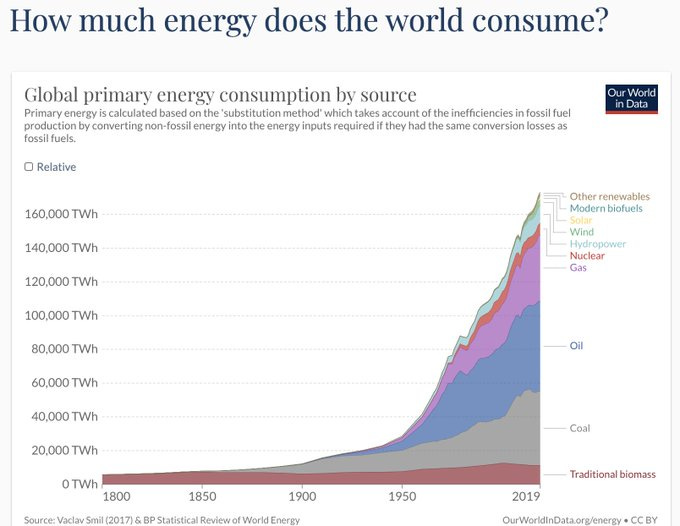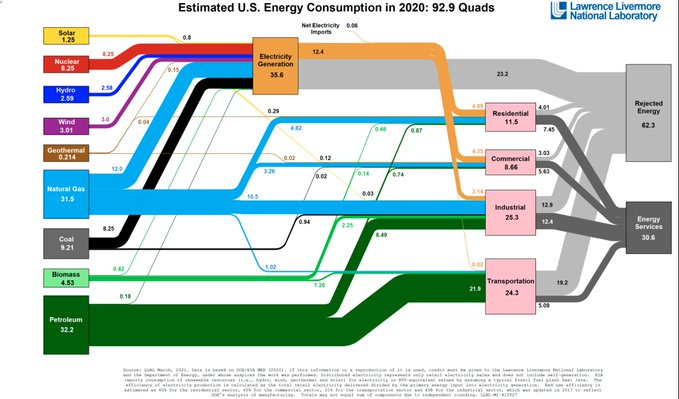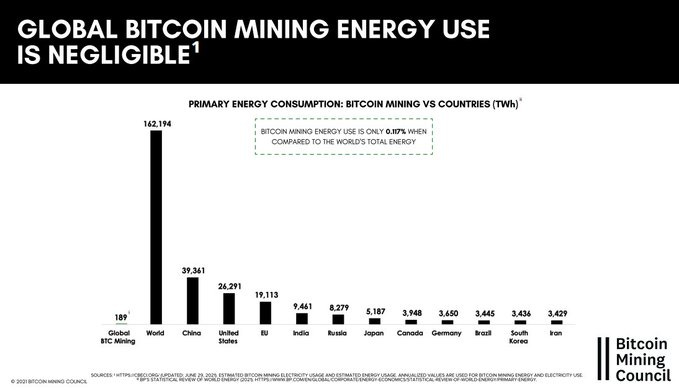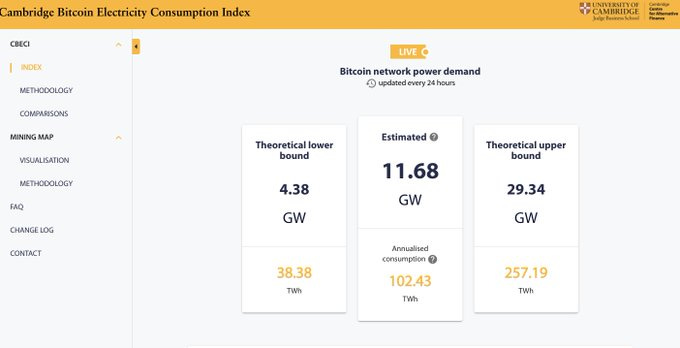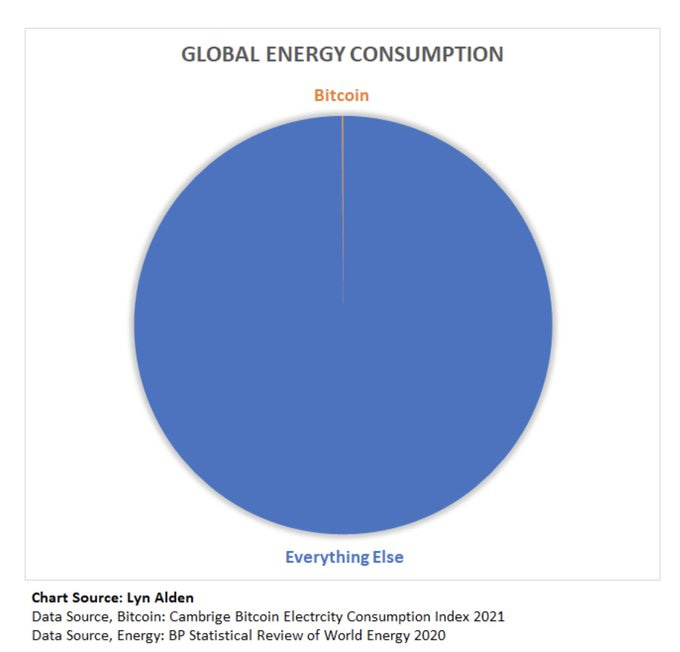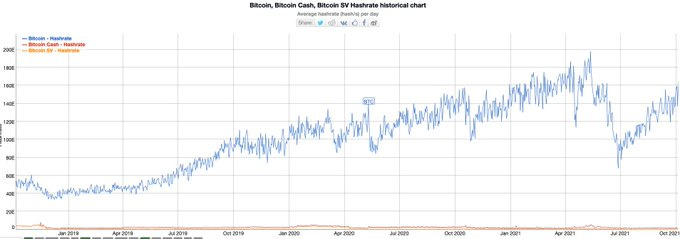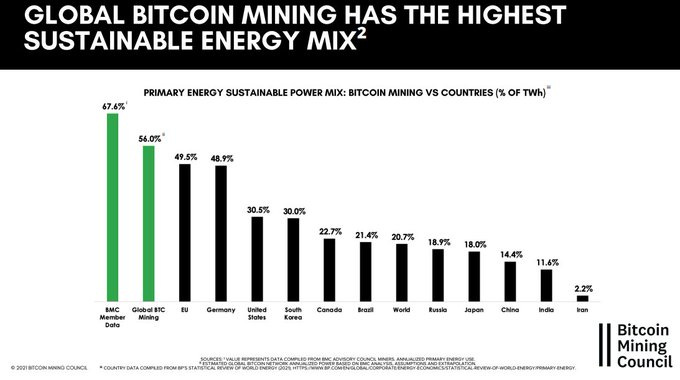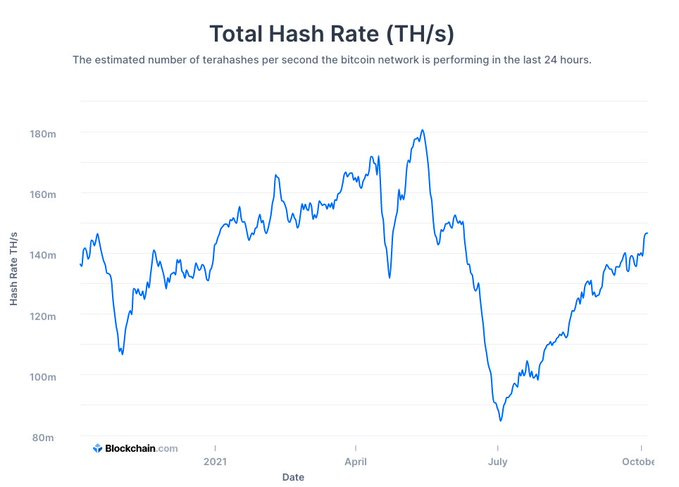Bitcoin & Nuclear | Part 1- Future of Energy Grid
Deep Dive into Energy Markets, Bitcoin's Energy Usage & Bitcoin Mining. Breaking down mainstream narratives along the way by offering industry insights, facts & some personal opinions
I'm feeling inspired today, so here goes a full length, easy to read, article on my latest twitter thread on 'Bitcoin & Nuclear - Future of Energy Grid | Part-1'. In part-1, I breakdown the narratives around energy markets in general, bitcoin's energy usage, cover some industry facts, insights and offer some of my personal opinions along the way for a hopefully enjoyable read. Let's dive right in.
Before i begin, I want to provide my own little background since its relevant to the topic today. I'm a Chemical Engineer by degree (BS & MS) & have been working as a lead engineer in advanced nuclear technology space for the last few years, so this topic feels like home. Having got this out of the way, let's get into it.
I want to give a shoutout upfront to some of the references i use and cite from in this thread. None bigger & better than Lyn Alden, i take charts and information from her recent newsletter to cover a part of this thread, everyone go read it here.
The other resources I'll cite from are the following (in no order)-
a) Bitcoin Mining Council Q2 2021 Report
b) Square's Paper on Bitcoin's Energy Usage
c) Only the strong survive by Allen
Let's start from the basics. What's the innovation in Bitcoin? Here’s a list I like, taken from Allen’s recent article, see here.
the proof-of-work algorithm
the difficulty adjustment
the native monetary unit that is able to endogenously emerge.
Socially, the innovation is an immutable and uncheatable distributed ledger.
To achieve this, bitcoin needs to have a tie in to the physical world- Energy. Energy expenditure is the tie in between the real world and the digital world. Henry Ford proposed this in 1921 to have a currency backed by energy for the world.
Full Article by Charles Edwards : ‘The Energy Standard’ - here
Henry Ford proposed the following design criterion for a universal money which would free the world back in 1921.
Backed by energy
Unconfiscatable
Fixed supply
Outside government control
There was nothing that satisfied these design criteria before, until bitcoin came along.
Bitcoin is an engineering breakthrough. It'll turn out to be the greatest invention/discovery of human history once we humans catch up to its brilliance. I treat it as akin to the discovery of fire by the early humans which pushed the civilization along.
Michael Saylor covers this with Robert Breedlove on his show. He goes through human discoveries which were crucial to the advancement of civilization as a whole and puts bitcoin in that bracket. Linked below-
Now that we've got that out of our way, let's go through energy first and put bitcoin's energy usage in relative terms to the total energy consumption. The world uses slightly north of 173k TWh of energy per year. Is that all the accessible energy to us humans?
No. Take a look below as US Energy consumption in 2020 for example. Out of 92.9 quads of energy available, only 30.6 quads gets put to use for energy services. So almost 2/3rd is rejected energy for multiple reasons. If we become more efficient, we can extract a lot more.
Also, there are plenty more sources of energy coming online and being worked upon which increases the total available energy supply sources even more. So, in a nutshell, there's decent amount of energy being used, plenty being wasted and more to come online.
Now, how much is bitcoin's energy expenditure to maintain POW consensus? Per Uni of Cambridge, Bitcoin's (peak) annualized energy consumption rate is around 103 TWh currently and was as high as 190 TWh earlier in the year, due to exodus of bitcoin mining in China this year.
How much is 103 TWh compared to 173k TWh? That's 0.06%. That's it. Even if you take the 190 TWh from earlier in the year, it's still only ~0.1%. So, bitcoin uses only 1/10 of 1% of world's total energy. That's it. Let's get this one fact right.
Bitcoin's energy use is simply a rounding error relative to global energy usage. Scientists who generally come up with energy usage numbers for the world can easily be off by 1-2% either direction, we're talking 1/10th of that here. Simply very little
Would bitcoin's energy usage go up over time? Yes. If bitcoin becomes successful in becoming the "energy currency" of the world, it's energy expenditure has to rise to defend the POW consensus and the network. If it's value to humans increases, so would its energy use. But.
Bitcoin's energy will forever be a rounding error relative to global energy consumption numbers. We'll go through the math later. It's energy usage won't exceed its long run utility (however large or small it becomes over time). Lyn covers this in her article amazingly.
Now, what's the MSM telling you? See below an excerpt. You see these all the time. We just established above that is not true at all, if anything bitcoin uses too little energy for its relative utility for the world today as we'll establish next. MSM is gaslighting you.
Before we dive into some of the energy math, let's point some of bitcoin's utility to the world today.
Fixed supply hard asset as store of value/wealth
Unconfiscatable private property rights
Censorship resistant, permissionless, peer to peer medium of exchange
Most Decentralized Monetary Network outside the control of any central authority or nation state (resilient to attacks)
Best form of bearer asset (pristine collateral)
Frictionless, borderless, instant, low cost, global payments network (Lightning Network - layer 2 solution built on top of bitcoin | Bitcoin scales in layers)
Do you think something with those properties, hardest form of money backed by energy can have any form of utility for humans going forward in the world we live in today? If the answer is yes (i hope), than 0.1% of world's energy usage is nothing and is easily justifiable.
Let's move on then to some bitcoin's energy math. First, let's establish how does bitcoin even consume energy? Like how does this Proof of work (POW) conensus model work? What does it even mean to mine bitcoin? Like WTF is all this.
Simply speaking, bitcoin's POW is designed to produced one 'block' every 10 minutes. A new block is produced by solving a math puzzle, by brute forcing it using computational work and therefore.. you guessed it, electricity or energy.
Energy expenditure is key to producing blocks and proof of work. In a way, bitcoin is backed by energy expended to secure the network by the miners who go about producing these blocks. Although, they don't control the network as was demonstrated in the blocksize wars.
The puzzle is designed as such that one block is produced roughly every 10 min. If it takes less time to produce a block, the puzzle gets harder to solve, while if it takes more time to produce a block, the puzzle gets easier. This is the 'difficulty adjustment' innovation which is key to bitcoin. Never in history have we had an asset whose supply is absolutely independent of demand, pre-programmed, engineered to precision and set in code, unmutable by any central authority.
Now due to the incentive model built into the network, millions of machines are deployed to 'mine' bitcoin blocks by offering computational power to the network or 'energy'. This is measured in something called the 'hash rate' which is currently at 166 EH/s
What do the miners get in return for providing this energy? They get block rewards, which consists of two things - block subsidy & transaction (tx) fees. Bitcoin block subsidy follows a 4 yr halving cycle (something you might have heard from the chart analysts all the time)
Block subsidy was 50 bitcoin per block when it started back in '09, dropped to 25B 4 yrs later, 12.5B 4 more yrs later and recently dropped to 6.25B last yr in May 2020. This is the only way new bitcoins can come into existence, so think about the supply shock?
The network suddenly tells the miners looking to mine bitcoins, "hey from today you'll only get 1/2 of what you used to get, and in 4 yrs it'll be 1/2 of that and so on". That's a tremendous amount of supply shock to the market itself.
We've seen in the past that bitcoin's price rise has been linked to these 'halving cycles' because of the inherent supply shock that comes along with it. As some say, 'number go up' is built into the consensus model itself.
Now enough of the mining rewards, we were talking energy usage weren't we? If we assume the market cap of bitcoin in the open market is how much value is locked onto the network, meaning that's how valuable bitcoin is to us humans, then..
We can table the energy expenditure or in other words security spending (energy) as a % of bitcoin's market cap to see if the network is getting energy efficient over time or not. The less the %, the more efficient the network is becoming, simply speaking.
Let's take the total block reward i.e. block subsidy & tx fees as a proxy for security spend on the network. This is not exactly true, since the security spend is only the electricity cost or energy expenditure which is a % of this reward. So, this is infact an upper bound
As we see, the annual security spend has gone up over time in USD terms, but as a % of bitcoin's market cap its been falling ever since 2011. In H1 2021, it sat at less than 2% of the market cap as Lyn pointed out in her article. This is exactly what the analysts do not get
Bitcoin is becoming incredibly energy efficient over time. It's using literally fractions of the value of the network to secure it now (2%). There's another halving coming in 2024 which brings the block subsidy down to 3.25B and the one in 2028 will bring it to 1.625B.
As you see, the security spend over the coming decade will keep getting cut short by this halving of block subsidy. For sure, more of the spend will be covered by the tx fees going forward. Lyn's expectation is to see the spend at 0.25-1% depending on tx fee levels.
Here are some projections for security spend as a % of bitcoin's market cap in the yrs to come. Let's say bitcoin reaches $1M (or ~$20T market cap) by 2025, and after 2024 halving security spend now goes down to say 0.5%, so that's a spend of $100B. Current spend is $16.5B.
That would mean that bitcoin's total energy usage in 2025 would be ~0.6% or 6x today's usage only. And keep in mind, security spend is not exactly the same as energy expenditure which is a % of it and secondly, the total energy usage of the world is going to go up as well.
For an easy math, we're still below ~1% of total world's energy usage to secure the network, even at a point where $20 trillion of world's monetary energy will be secured in the network itself. That's super low energy usage for something of such grand utility, wont you say?
Here is a comparison of bitcoin's current energy use to other industries and its CO2e emissions as well. As we've gone through the numbers before, bitcoin's energy use is a rounding error as of now. Nothing to add.
Now having established bitcoin's energy usage numbers, let's look at the energy mix of current usage. As reported by Bitcoin Mining Council's Q2 report, bitcoin's energy mix is the most sustainable out there and is significantly more so than most countries.
MSM paints a picture that bitcoin miners are competing with other industries for electricity, as if it would push someone else out of their energy usage. This is not true. Bitcoin miners go looking for the cheapest source of electricity out there. Why?
Because thats like majority of their daily operation cost of running the miners. They simply cannot compete with the other miners on a global scale with moderate to high cost electricity prices charged for normal users. So they are not your competitors.
Bitcoin miners seek to find supply vs demand inefficiencies in the power markets and look for underutilized or wasted sources of energy to gain a competitive advantage over other miners by securing a low cost of energy. This is a global hunt everywhere.
Humans have never organized themselves around an energy source, atleast that's not been the major driver of human settlements. You generally see energy being transported and brought to them instead of them settling around energy.
Bitcoin miners are unusual in this way. They will go anywhere where the energy is cheapest to mine. Here are some unusual snipetts about them. - They can co-locate at the source of electricity generation - They can consume intermittently without harming their core business
Energy cost is like 80-90% of their operations cost - All they need is available land & an internet connection (cellular or satellite) - They are buyers of any stranded sources of energy, anything below 6c/kWh - They can make new energy projects economically viable
That sounds like an incredibly interesting bunch of people to study a little bit more. Like, who are these freaks? Any anecdotes? Okay let's dig in a bit more and get some evidence of these unusual set of individuals and why I call them 'Stranded Energy Hunters'
China had been the biggest mining country for a long time until 2021 after the china mining ban and mass exodus of miners from their provinces over the last few months. The province of Sichuan is unique. They have a ton of over-built hydroelectric capacity which goes wasted
During the wet season, they produce more than they can use. So, these chinese bitcoin miners flock to Sichuan to capture that stranded or wasted energy to mine bitcoin instead. Simply because.. yes, the incentives to find the cheapest energy possible to mine.
What would happen to this energy if they had not used it to mine bitcoin instead? Would just have gone to waste. No use. Bitcoin miners turned that stranded energy into a source of revenue. Most of these miners are now flocking to the west in light of the mining ban.
Look at bitcoin's hash rate again. See that massive drop >50% in hash rate after the china mining ban. Well guess what, its almost back up to where it was before. Talk about how resilient this network is. No single point of failure. No single country controls or governs it
Here's another example. 'Flared Gas Mining'. Many oil-fields have trapped natural gas associated with it. Typically, these drilling sites are far out and have no connected pipelines through which you can transport and sell this gas, if it is in reasonable quantities to sell
With natural gas prices so low, it doesn;t make sense to invest in pipeline or related infrastructure to transport them. So what's the option? Vent it in open atmosphere or flare it. First vents methane, the latter CO2. Quantities? 1.48 billion cu-ft or 150 TWh per US-EIA
That's only in US in 2019 and not even worldwide. Remember how much energy bitcoin network uses today? - 100 TWh. So you can power the entire network and more by simply capturing this stranded gas which is flared instead. Would it be helpful to the environment? Absolutely.
Now here's a great one, which is my favorite. The concept of 'Bitcoin as an Energy Battery'. The firs time i heard of this was from this article. Nick talked about how Iceland transports its vast amounts of geo-thermal energy to the world by aluminum
Bitcoin as Battery - Nick Grossman
Iceland uses its renewable geothermal energy which is otherwise stranded since its difficult built pipelines to it under the Atlantic, to smelt aluminum, and then they transport Aluminum to the world. So in a way they are transporting energy. Aluminum serves as the battery.
Like what is even an energy battery? Something that can transport energy across both space and time. Well, guess what? That's exactly what bitcoin is. And much better at it, than literally anything else in the world, its the most liquid form of energy battery.
Something that can run 24/7, permissionless, frictionless, borderless, unconfiscatable, resilient, least energy loss, most power dense form of battery the world has ever seen. Wouldn't it be wise for Iceland to mine bitcoin instead using their geothermal instead of Al? Yes.
Electric grids balance two things - supply and demand. Very few sources of energy can run 24/7 uninterrupted. Nuclear is the best one. Solar, Wind, Hydro are all variable depending on weather conditions. Due to this variability, grids are over-built on the supply side.
Demand from the consumers varies as well, especially season to season and between day & night. You get periods of peak demands in between. So you've got to cater to this variable demand. Hence, its always a balance the grids need to maintain.
One big problem with intermittent sources of energy like solar and wind is storage. They are simply not reliable as base load w/o energy storage. And energy storage is not an easy problem to solve. Guess what, we may just have an engineering option on our hand -bitcoin.
The chart below shows the 'Energy Return on Investment (EROI)' for energy sources. If you see, with how it is currently, solar/wind do not even meet the energy threshold when looked at buffered i.e with storage costs included.
Nuclear has a 75x EROI with no energy storage cost. Simply the best energy source we have available on the planet, and keep shutting down our nuclear power plants. Why? Again MSM narratives and certain accidents in the past have changed public opinion. But facts are there.
Other renewable forms of energy could do with bitcoin as their energy storage option to lower their cost of storage and become economically more viable as projects for investments. Bitcoin miners can help make advanced energy technology projects ecomonically viable options.
Bitcoin miners can serve as first customers & buyers of last resort for these advanced energy technology solutions and help get them long term investment capital to make them succeed. As we've seen all along bitcoin & energy are intricately intertwined.
In my opinion, bitcoin will lead us into a Type-I Kardashev Civilization, one that can use and store all of the energy available on its planet. Today we're a Type-0 civilization, and this process can take years to play out. I may not be here to see it in person.
Let's do some quick takeaways then from this thread before we wrap up.
Bitcoin has great utility & is important for humans. Not everyone may use or appreciate its utility today, which is fine, but that doesn’t mean it doesn’t hold utility to others. Currently, close to $1 trillion of world’s wealth is stored in it, that’s a lot of monetary energy to disregard.
Bitcoin uses only ~0.1% of global energy. Current energy usage is between 100-200 TWh/yr and per our projections math, bitcoin’s energy usage will always be a rounding error with regards to global energy consumption. It would most likely be sub 1% for a long time to come.
Bitcoin, in fact, may use too little energy for the value it may store in the future. Considering bitcoin grows over this coming decade and stores $20T of world’s wealth, maybe even $50T, or dare i say $100T, that’s a lot of monetary energy to be secured safely and protected. We should invest & use more energy to protect the network than what we do currently.
Bitcoin miners are highly mobile & look for the cheapest & lowest cost energy to mine.
Bitcoin miners do not compete with other industries or your personal use for energy
Energy usage is a good thing. You probably want to live in a place where there is a good amount of energy available to use and enjoy, rather than too little. We need to use & harness more energy to become a Type-I civilization which will take decades.
There are a lot of items i did not cover in this thread which I'm planning to write as a more detailed follow up to this, wanted this to be an introductory thread. Focus of the next one would be a deep dive on energy markets, energy grid structure, synergy netween next generation molten salt nuclear reactors & bitcoin mining and a whole lot more of bitcoin energy math & future projections. If you liked reading this, do let me know on twitter, i appreciate any feedback. Thanks for spending time going through this. Cheers!






